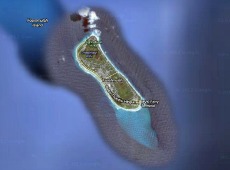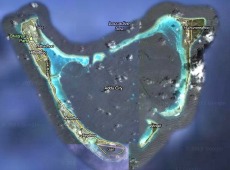Transparency Maldives has called for stronger anti-corruption climate finance safeguards, following the government’s declaration it would establish a ‘green fund’ that would merge all climate change, conservation, and sustainable development project trust-funds.
President Mohamed Waheed Hassan Manik’s cabinet proposed a Maldives “Green Fund” be established, which would merge all the currently established trust funds in accordance with the government’s Biosphere Reserve sustainable development policy.
The purpose for merging the funds would be to enable cost reductions and strengthen operational efficiency for foreign investments for waste management, water management and renewable energy projects.
Shortly following this April 30 announcement, Transparency Maldives called for “stronger anti-corruption safeguards in climate finance” as part of the civil society recommendations presented to the Minister of Environment and Energy Dr Mariyam Shakeela during the “NGO Forum on Environment and Sustainable Development 2013” held May 5.
During the NGO forum, Transparency Maldives Chairperson Mohamed Rasheed Bari called on the government to strengthen governance mechanisms by including stronger standards of transparency, accountability and integrity.
Currently, climate funds are “scattered” because there is no consolidated national governance mechanism with a proper internationally governed governance structure in the Maldives, Transparency Maldives Climate Governance Senior Project Manager Azim Zahir told Minivan News today (May 19).
“In principle establishing a ‘green fund’ to consolidate climate change mitigation and adaptation money is ‘ok’ as long as it adheres to international best practices and good governance standards,” said Zahir.
The Environment Ministry had not responded to inquiries at time of press.
No overarching climate policy
“The government lacks an overarching climate change policy,” a civil society source familiar with the challenges facing climate governance in the Maldives, told Minivan News. “There are no specific goals, which has resulted in project-based, ad hoc and climate change mitigation and adaptation initiatives.”
The source explained that conflicting ministerial mandates and unclear rules have created redundancies and left civil servants “confused”.
 “The root cause of the problem is administrative – the lack of clear mandates between who is doing what,” the source said. “There are also ministerial rivalries regarding certain projects because clear mandates are lacking.”
“The root cause of the problem is administrative – the lack of clear mandates between who is doing what,” the source said. “There are also ministerial rivalries regarding certain projects because clear mandates are lacking.”
“I find it strange the Ministry of Environment does not have a climate change department, considering they are the people in charge of the entire amount of funds,” the source added.
“One person is in charge of massive [amounts] of funds. There is a lack of human resources within the Environment Ministry. Only a couple of people have dominated [climate change projects] since the 1990’s,” claimed the source.
Some people within the ministry working on foreign aid projects write themselves in as project staff as well to in order supplement their “really low” monthly government salaries of MVR 6000 to MVR 8000 (US$ 389 to US$ 519), alleged the source.
“The same people work on each project, they don’t have new people,” the source claimed.
“These senior civil servants say the Environment Ministry lacks capacity and young people with knowledge and technical skills, however they are not providing training and opportunities [to the newer civil servants].
“They have a complete monopoly on knowledge” which is not being properly diffused, the source added.
Politics and bureaucracy
After the Foreign Ministry has signed a bilateral agreement the funds are transferred to the Finance Ministry, which then allocates the money to the applicable ministry or government agency, according to the source.
Most climate projects were handled under the Ministry of Housing and Environment during former President Mohamed Nasheed’s administration, the source explained. Additionally, the President’s Office also undertook many climate change initiatives and established the Presidential Advisory Council on Climate Change in 2009.
“The council still exists on paper and while some people within the President’s Office said the council members have been changed [following the controversial transfer of power February 7, 2012], no one has been informed if they have been fired. They have no idea what’s going on,” alleged the source.
Additionally, the National Planning Council (NPC) – chaired by the president and consisting of various ministers and civil society representatives – was formed in February 2009 to coordinate equitable sustainable development nationwide.
Currently the NPC website states: “Due to the change of the Government , the work of the National Planning Council is currently under reform. Therefore all proposals and issues submitted to Department of National Planning/ National Planning Council is on hold for the time being.”
Under President Waheed’s government the Ministry of Housing and Environment was split to form two new entities, the Ministry of Housing and Infrastructure as well as Energy and Environment.
Due to the these changes and ongoing government instability “There has been a significant change in the process of how the project [cycle] works,” explained the source.
“For various political reasons – and the delicate nature of politics since February 2012 – climate change funds have not been consolidated,” the source continued. “It takes a lot of work to channel climate funds. Even under Nasheed’s previous administration there were the same problems.”
An additional reason Waheed’s administration “differs” from Nasheed’s is the current government “has not been ‘very keen’ on cooperating with civil society,” alleged the source.
“Previously they behaved really unprofessionally toward certain NGOs, however since the latter half of 2012, the government has started to try and engage NGOs and civil society – maybe to increase the administration’s legitimacy,” the source continued.
“A positive is the Environment Ministry under Waheed’s administration has been very active. They actually try to do things,” the source noted.
“However, the government consults civil society stakeholders after they’ve already decided everything. They invite NGOs to listen to their opinions, but do not seek their input during the project planning phase,” the source added.
“Ultimately, most [climate finance] problems apply to both administrations, under Nasheed and Waheed,” the source added.
Existing trust funds
“There are three umbrellas – the Maldives Environmental Management Project (MEMP), the Climate Change Trust Fund (CCTF), the Sustainable Renewable Energy Project (SREP) – under each there are different components,” Environmental Protection Agency (EPA) Environment and Social Safeguards Coordinator Ibrahim Mohamed told Minivan News earlier this month.
“The idea is that these projects be developed in such a way that the entire nation becomes a biosphere reserve, that’s the overall goal,” he added.
The MEMP umbrella is a US$ 13.88 million World Bank loan, approved in 2008 and set to close in 2014.
“The MEMP is a soft loan in the sense the interest is very less, and this project also has several components,” said Mohamed.
“Only one component is solid waste management, focused in Ari Atoll. Other areas include environmental monitoring, training and capacity building, and a bachelor of environmental science was established at the Maldives National University (MNU),” he continued.
“There is also a renewable energy component to install solar roofing of public buildings on Thinadhoo [Island in Huvadhoo Atoll], so at least 25 percent of their energy will come from solar. That component also has awareness and training on energy efficiency and conservation of energy.
The US$ 9.5 million CCTF picks up where MEMP left off, according to Mohamed.
“Under the CCTF umbrella we have three components: clean energy for climate mitigation, wetland conservation and coral reef monitoring, as well as solid waste management,” Mohamed explained.
“The World Bank is managing the donor money from the CCTF. They don’t finance directly to the government, because they want it to be managed by a reliable, transparent, international fiduciary system.
“The CCTF idea is that the project(s) we develop becomes an exemplary example for other small island states,” he added.
The CCTF was established in 2010 after the signing of an MOU between the Maldives government, the World Bank Group and the European Union with the aim of targeting solid waste management, capacity building for environmental management, and technical assistance for monitoring and managing key natural assets.
The US$138 million SREP was established in 2012 to generate 16 megawatts of renewable energy on 50 islands in the next five years.
The SREP scheme was directly related to the Scaling-up Renewable Energy Program (SREP) originally planned to be submitted to the World Bank in February 2012, but was not due to the political upheaval that resulted from Nasheed’s controversial resignation February 7, 2012.
Additionally, the Maldives has received Global Environment Facility (GEF) grants totaling US$14,443,426 – that leveraged US$35,176,820 in co-financing resources – for 10 national projects, four regional projects, and eight small grants. The project areas focus on climate change, biodiversity, international waters, land degradation, persistent organic pollutants, and the ozone layer.
The GEF is an independently operating financial organisation that supports national sustainable development initiatives and addresses global environmental issues by working in partnership with the United Nations, United Nations Development Programme (UNDP), and Asian Development Bank (ADB) as well as civil society organisations and the private sector.
The GEF “unites” 183 countries with these actors and claims to be the largest public funder of projects to improve the global environment.
“The EU has suggested that the Maldives’ government look at one atoll with the potential for populations to move and to live and do more projects there – such as waste management, clean energy, protection, preservation, adaptation – all things in one big area, so that these things will be more visible,” said Mohamed.
“If all the components go into one atoll they will become more climate resilient,” he added.
Likes (3)Dislikes
(3)Dislikes (0)
(0)  “The root cause of the problem is administrative – the lack of clear mandates between who is doing what,” the source said. “There are also ministerial rivalries regarding certain projects because clear mandates are lacking.”
“The root cause of the problem is administrative – the lack of clear mandates between who is doing what,” the source said. “There are also ministerial rivalries regarding certain projects because clear mandates are lacking.”
